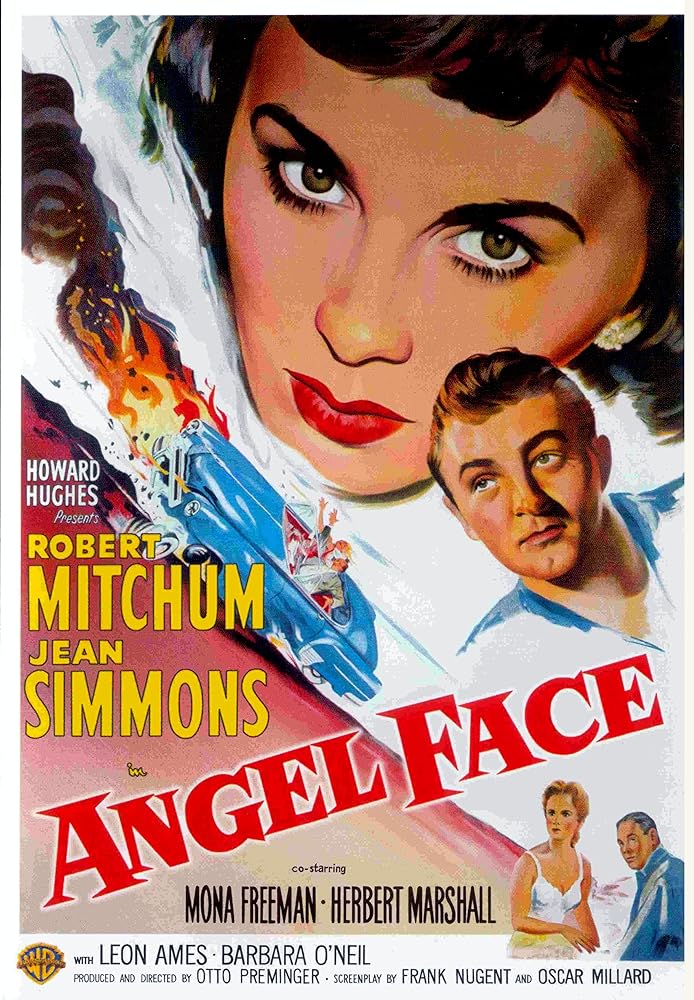
ANGEL FACE
(director: Otto Preminger; screenwriters: from a story by Chester Erskine/Oscar Millard/Frank S. Nugent; cinematographer: Harry Stradling; editor: Frederic Knudtson; cast: Robert Mitchum (Frank Jessup), Jean Simmons (Diane Tremayne), Mona Freeman (Mary Wilton), Herbert Marshall (Charles Tremayne), Leon Ames (Fred Barrett), Barbara O’Neil (Mrs. Kathryn Tremayne), Ken Tobey (Bill), Jim Backus (District Attorney Judson), Morgan Farley (Juror), Raymond Greenleaf (Arthur Vance), Robert Gist (Miller); Runtime: 91; RKO; 1952)
“An outstanding melodrama.”
Reviewed by Dennis Schwartz
An outstanding melodrama. It’s a film noir that is influenced by Freudian psychology, and was shot in 18 days by Otto Preminger. The reason for the rush is that Howard Hughes, the RKO owner, just bought Jean Simmon’s contract from the English studio of J. Arthur Rank and the star, who disliked Hughes, had only 18 days on her contract left. The result was that this was arguably her best film performance and Otto, a known bully to actors, came up with an intelligent and exciting thriller. The film scores big because of the great nuanced performances from the stars Robert Mitchum and Simmons, plus the sharp black and white photography contrasting the wealthy estate to Mitchum’s humble stature and rosy dreams. The noirish tale of the protagonists getting hooked on sex and money gave the film the dark energy it thrived on.
Mrs. Kathryn Tremayne (O’Neil) is almost asphyxiated by gas in her bedroom but her novelist husband, Charles (Marshall), has come in the nick of time to get some air into her room. Kathryn thinks someone wants to kill her for her money. Charles married Kathryn after his wife died, and she supports him and his daughter in her mansion. Ambulance driver Frank Jessup (Mitchum) answers the call to the Beverly Hills mansion and when he tells the attractive stepdaughter, Diane (Simmons), that her mother will be fine she only requires a sedative, Diane gets hysterical and doesn’t seem all that pleased.
The manipulative Diane sets her sights on Frank and works to break up his relationship with nice-girl nurse Mary (Freeman). Even though Diane looks angelic, behind her serene beauty is an unbalanced state of mind. She maneuvers to get Frank hired as the family chauffeur to drive her expensive sports car and even use it to enter racing events, as the ambitious Frank is interested in becoming a racing car driver and opening up his own specialty racing car shop. Diane talks her stepmother into sponsoring him in that business, but then lies to him and says her mother is only playing with him. She fails to tell Frank there is a delay because her mother’s lawyer is out of town.
The lower-class Frank is attracted to Diane and believes she can help his career, but doesn’t think this romance could work. Threatened by Frank leaving her and doting on her father’s unconditional love that she doesn’t want to lose to a stepmother she irrationally hates, Diane rigs the car so that when her stepmother puts the gear into reverse it goes over the cliff. But what Diane didn’t figure on, is that her father was also in the car and was also killed.
Diane and Frank are accused of murder, and their case goes to trial. She is being represented by a top lawyer, Barrett (Ames), who suggests she should marry Frank. The lawyer correctly reads the jury’s mind and gets an innocent verdict for both of them.
Warning: spoiler to follow in the next paragraph.
When back in the mansion, Frank realizes Mary won’t have him anymore and decides to get a divorce. He packs for a trip to Mexico. But Diane can’t live without her father and now Frank, and offers Frank a fatal ride to the bus station.
REVIEWED ON 9/13/2001 GRADE: A